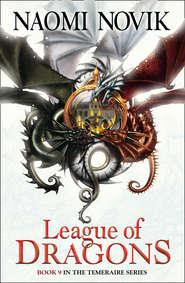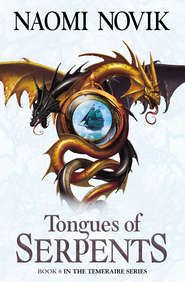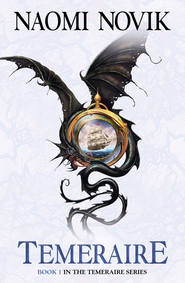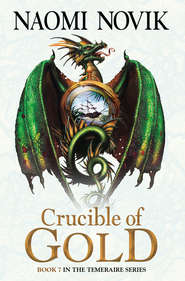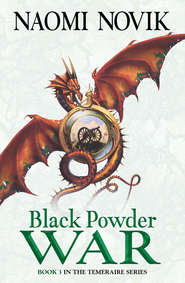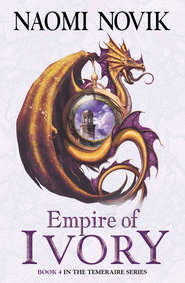По всем вопросам обращайтесь на: info@litportal.ru
(©) 2003-2024.
✖
Victory of Eagles
Автор
Год написания книги
2019
Настройки чтения
Размер шрифта
Высота строк
Поля
‘We may have some difficulty on our journey,’ Tharkay said. ‘Almost all of Bonaparte's men are stationed on the coast, but his dragons are going deep inland. Fifty thousand men, I believe,’ he answered, when Laurence asked how they faced, ‘and as many as two hundred beasts, if one cares to believe the figure. The Corps has fallen back with the rest of the army, to Rainham. I imagine to await Bonaparte's pleasure, as for why they are being so courteous, you would have to ask the generals.’
‘I thank you for coming,’ Laurence said. Tharkay had risked a great deal, with half of Bonaparte's army between him and the coast. ‘You have taken service, then?’ he asked, looking at Tharkay's coat. He wore gold bars: a captain's rank. In the army it was not uncommon for a man to be commissioned only when he was needed, but it was a rare phenomenon in the Corps, where the type of dragon dictated rank. But with Tharkay was one of the few who could speak with the feral dragons of the Pamirs it was no surprise the Corps had wanted him. It was more of one that he had accepted a commission.
‘For now.’ Tharkay shrugged.
‘No one could accuse you of making a self-interested choice,’ Laurence said grimly, with the smell of the burning city in his nostrils.
‘One of its advantages,’ Tharkay said. ‘Any fool could throw in his lot with a victor.’
Laurence did not ask why he had been sent. Fifty thousand men landed was answer enough. Temeraire must be wanted, and Laurence the only, however undesirable, means to obtain his services. It was a pragmatic and temporary choice, nothing to give him hope of forgiveness either personal or legal. Tharkay volunteered no more, Gherni was already springing aloft, and the wind blew all possible words away.
The sky held the peculiar crispness of late autumn, blue, clear and cloudless, beautiful flying weather. They had scarcely been half an hour aloft when Gherni suddenly plunged beneath them, and trembling went to ground in a wooded clearing of pines. Laurence had seen nothing, but he and Tharkay pushed forward to the edge of the woods and peered out from the shade. Two shapes leapt from the ground, and approached. The two big grey-and-brown dragons, glided with lazy assurance, and well they might. Grand Chevaliers were the largest of the French heavyweights, and only a little smaller than Regal Coppers. Each had what looked close to a dozen stupefied cows dangling in their belly-netting, occasionally uttering groggy and perplexed moans, and pawing ineffectually at the air with their hooves.
The pair went by calling to each other cheerfully in French too colloquial and rapid for Laurence to follow, their crews laughing. Their shadows passed like scudding clouds. Gherni held very still beneath the branches. Her eyes were the only part of her which moved, tracking the great dragons' passage overhead.
She could not be persuaded back aloft, afterwards, but curled up as deeply as she could, and proposed that they should bring her something to eat instead. She would not go up again until it was dark. That the French Fleur de Nuits would be out then, was not an argument Laurence wished to attempt, for fear of her refusing to go on at all. Tharkay only shrugged, examined his pistols, and put himself on a track towards the nearby farmhouses. ‘Perhaps the Chevaliers have not eaten all the cattle.’
There were no cows left visible, nor sheep, nor people. Only a scattering of unhappy chickens, upon which Tharkay methodically loosed the kestrel, taking one after another. They would not make much dinner for Gherni, but they were better than nothing. then they discovered a small pig in the stable, rooting in the straw, oblivious both to the fate it had earlier escaped and the one now descending upon it.
Gherni was neither picky nor patient enough to demand her pork cooked, and they roasted the chickens for themselves over a small, well-banked fire, feeding the kestrel on the sweetbreads, and waving their hands through the smoke to thin it out. Without salt the meat had little flavour, but did well enough to fill their stomachs. They gnawed down to the bones, rubbed their greasy hands clean with grass, and buried the remnants.
And then they had only to wait for the sun to go down. It was scarcely noon, and the ground cold and hard to sit upon, the wind blowing a steady chill into fingers and feet, despite their stamping. But Laurence could stand when he chose, and go to the edge of the copse and feel the wind blowing into his face, and see the placid well-ruled fields in their orderly brown ranks and tall white birch-trees raising their limbs high against the unbroken sky.
Tharkay came and stood beside him. There was no alteration in his looks or manner. If he was silent, he had been silent before. To be able to stand here for a moment, not as a traitor, but only himself, unchanged, in the company of another, was to Laurence as liberating as the absence of locks and barred doors. He had suffered wide disapproval before without intolerable pain, when he knew himself in the right. He had not known it could be so heavy.
Tharkay said, ‘I might never have found you, of course.’
It was an offer, and Laurence was ashamed to be tempted; tempted so strongly that he could not immediately make his refusal, not with freedom open before him and the stench of smoke and the ship's bilges still thick in the back of his throat.
‘My idea of duty is not yours,’ Tharkay said. ‘But I can think of no reason why you should owe a pointless death to any man.’
‘Honour is sufficient purpose,’ Laurence said, low.
‘Very well,’ Tharkay said, ‘if your death would preserve it better than your life. But yet the world is not shared between Britain and Napoleon, and you do not need to die. You and Temeraire would be welcome in other parts of the world. You may recall there is some semblance of civilization,’ he added dryly, ‘in a few places, beyond the borders of England.’
‘I do not—’ Laurence said, struggling, ‘I will not pretend that I do not consider it, for Temeraire's sake if not my own. But to fly would be to make myself truly a traitor.’
‘Laurence,’ Tharkay said, after a pause, ‘you are a traitor.’ It was a blow to hear him say so, in his cool blunt way. The lack of passion in his words only made them seem less accusation than statement of fact. ‘Allowing them to put you to death for it may be your form of apology, but it does not make you less guilty.’
Laurence did not know how to answer. Of course Tharkay was right. It was useless to cry that he loved his country, and had betrayed her only in extremis, as the lesser of two hideous evils. He had betrayed her, and the cause mattered not. So perhaps he now condemned Temeraire to lonely servitude, and himself to life-long imprisonment, for nothing. Perhaps all that could be lost, had been lost. And yet he could not answer.
They stood silently for a long time. At last, Tharkay shook his head and put his hand on Laurence's shoulder. ‘It is getting dark.’
‘Yes, I sent for him,’ Jane said flatly. ‘And you may leave off your coughing and your insinuations, if I wanted a man between my legs that badly, there is a camp full of handsome young fellows outside, and I dare say I could find one out to oblige me without going to such trouble.’
Having momentarily appalled her audience of generals and ministers into silence, she rode on, ‘If the French took him prisoner, they would have two Celestials; and even if the two are too close related to breed direct, they will crossbreed them—perhaps to Grand Chevaliers, if you like to imagine that—and breed the offspring back to fix the traits. In one generation they will have a breed of their own, and we nothing. We haven't a single egg out of Temeraire yet. Put Laurence in a gaol-wagon and bring him along under guard, if you insist, but if you have any sense you will make use of him, and the beast.’
The atmosphere in the tent was not a convivial one. Conversation circled endlessly around the disaster of the landing and Laurence had already gathered enough to realise that Jane had not been in command of the aerial defence, after all. Sanderson had been made admiral at Dover, over her head.
For what reason, Laurence scarcely needed to wonder. They had never liked making her commander, but having been forced to do it by necessity, they would likely have gone on rather than admit a mistake. Had they not wanted vengeance, had they not thought her complicit in Laurence's treason.
As for Sanderson, Laurence knew little about the man. He was handler to a Parnassian and commanded a large independent formation at Dover. They had served together, but not closely. Thoroughly experienced but no brilliant officer, Sanderson's attention was badly divided. Though his Artemisia had been dosed with the cure several times, she still fared poorly from the after-effects of the epidemic. It had nearly killed him too. He was not a year short of sixty, and had scarcely slept or eaten while his dragon ailed.
He now sat in a corner of the tent and dabbing an oozing cut over his eye with a folded bandage. He said nothing while the generals shouted at Jane instead. He looked grey and faded under the bright bloody streak across his forehead.
‘Splendid, so you would put a known traitor and his uncontrollable beast into the middle of our lines,’ one member of the Navy Board said. ‘You may as well rig up a telegraph and signal our plans to Bonaparte at once.’
‘Bonaparte can't damned well have an easier time of it than he has already, unless you run up a white flag,’ Jane snapped. ‘He has a hundred dragons more than he ought to, by any counting. You Admiralty gentlemen swear up and down that we would know he'd stripped Prussia and Italy to the bone, so I suppose he is pulling them out of the trees, and as we can't do the same, we must have every last beast we can scrounge. Six beasts too injured to fight in the next month, four of our newest ferals slunk off, and you want to let a Celestial moulder. It's pure idiocy.’
‘Why precisely are we listening to this haranguing fishwife?’ someone said.
‘To be more precise,’ Jane said, ‘you are not listening to me. But you had better start. Begging your pardon Sanderson, you are a damned fine formation-leader, but you weren't the man for this.’
‘No, not at all, Roland,’ Sanderson said, dully, and patted the cloth to his forehead again.
‘We are listening to her,’ another general from the back, said impatiently; he was a lean sharp-faced man with a decided aquiline nose, and wore the Order of the Bath, ‘because you could not scrape up a competent man for the job. We are not going to beat Bonaparte with yesterday's mess.’
‘Portland—’ another began.
‘Stop bleating the man's name like a talisman,’ the general returned. ‘If it is not Nelson with you, it is Portland. Gibraltar is as bad as Denmark, neither of them can be here in under a month. Until then, get out of her way.’
‘General Wellesley, you cannot seriously support the suggestion—’ another minister said, gesturing to Laurence.
‘I am capable of deciding to what I will support, without consultation. Thank you,’ Wellesley said. He looked Laurence up and down with a cold dismissive eye. ‘He's a sentimentalist, isn't he—surrendered himself? Damned romantic. What difference does it make? Hang him after.’
Jane took him to her tent. ‘No, you had better stay, Frette,’ she said, speaking to her aide-de-camp, who had risen from a camp-table as she ducked inside. ‘I will not make hay for any more rumours.’
She poured herself a glass of wine, and drank it with her back to Laurence. He could not quarrel with her decision, but he wished that they had been alone. He felt it impossible to speak as he wished before anyone else. Then she put down the glass and sat down behind her desk. ‘Tomorrow you will go by courier to Pen Y Fan,’ she said tiredly, without looking at him. ‘That is where they have been keeping Temeraire. Will you bring him back?’
‘Yes, of course,’ Laurence said.
‘They will very likely hang you after, unless you manage to do something heroic,’ Jane said.
‘If I wished to avoid justice, I might have stayed in France,’ Laurence said. ‘Jane—’
‘Admiral Roland, if you please,’ she said, sharply. After a moment's silence, she added, ‘I cannot blame you, Laurence. Christ knows it was ugly. But if I am to do any good here, I cannot be fighting their damned Lordships as well as Napoleon's dragons. Frette will take you to the officers' tent to eat, and then find you somewhere to sleep. You will go tomorrow, and when you come back you will be flying in formation, under Admiral Sanderson. That will be all.’
She gave a jerk of her head, and Frette held open the tent flap clearing his throat. Laurence could only bow, and withdraw slowly, wishing he had not seen her drop her forehead to her clenched fist, and the grimness around her mouth.
He felt a dreadful sense of awkwardness when entered the large mess tent in Frette's company. He saw none of his nearest acquaintance, and was glad to postpone that evil, but several remarks were made by little known captains. He pretended not to hear, the discomfort and downcast faces of those who would not snub him, but still did not choose to meet his eyes, was worse.
He had been braced for this, so was unprepared when his hand was seized, and aggressively pumped by a gentleman he had only seen perhaps twice before, across the officers' common room at Dover. Captain Hesterfield loudly said, ‘May I shake your hand, sir?’ too late for the request to be refused, and then nearly bodily dragged Laurence over to his table in the corner, and presented him to his companions.
There were six officers at the small and huddled table. Two of them were Prussians, one of whom, Von Pfeil, Laurence recognized from the siege of Danzig, and another who introduced himself as cousin to Captain Dyhern, with whom they had fought at the Battle of Jena. They were now refugees, having chosen exile and service in Britain over the parole Napoleon had offered to Prussian officers.
Another stranger, Captain Prewitt, had been recalled to England a few months before, out of desperation. His Winchester had escaped the epidemic, as they were ordinarily assigned to Halifax covert. He had been stationed on a lonely circuit out in Quebec to put him out of the way of anyone hearing his radical political views, as he freely acknowledged.
‘Or perhaps it was my poetry,’ Prewitt said, laughing at himself, ‘but my pride can better stand condemnation of my politics than of my art, so I choose to take it so. And this is Captain Latour,’ a French Royalist turned British officer. Hesterfield and the two others, Reynolds and Gounod, were Prewitt's political sympathizers, if a little quieter than he on the subject, and Laurence gradually realized the little group not supporters of his act, but were divided from the rest of the company precisely because they quarrelled over its morality.






